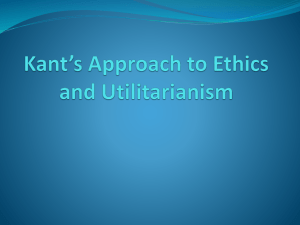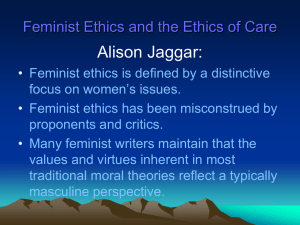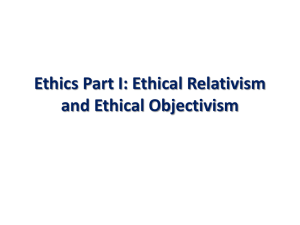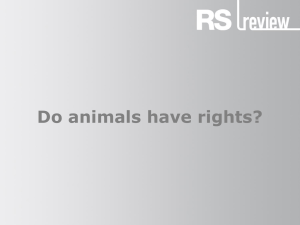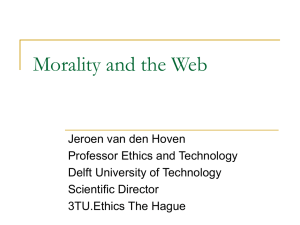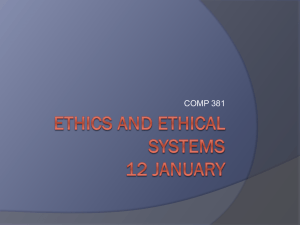Theory of Knowledge: Ethics & Moral Reasoning
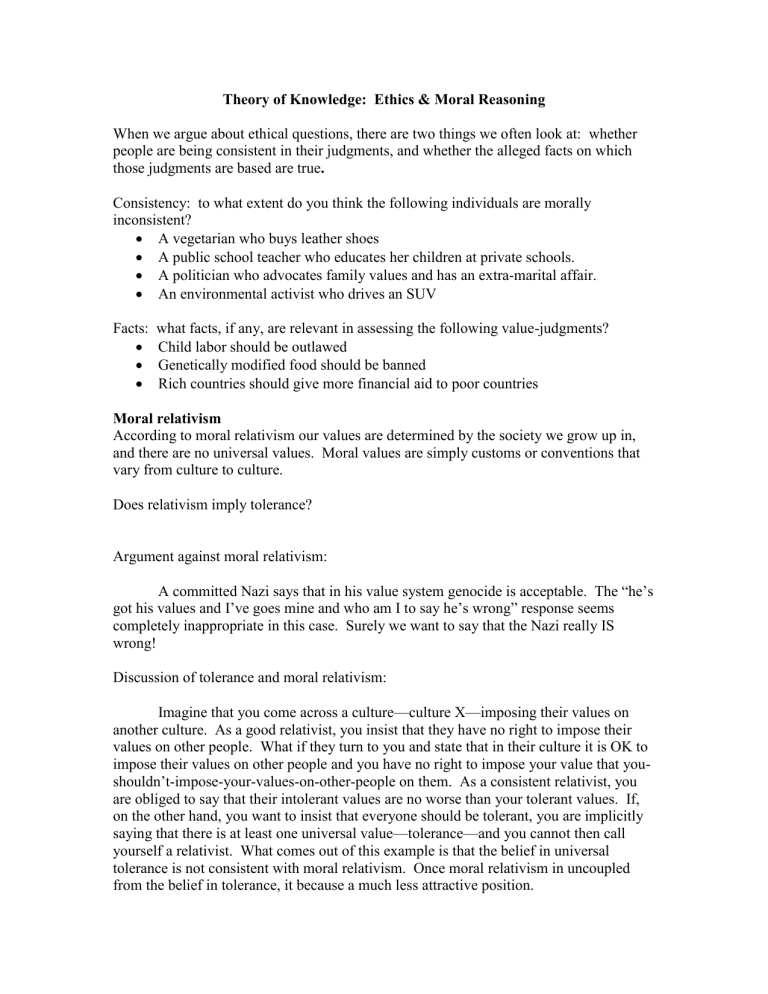
Theory of Knowledge: Ethics & Moral Reasoning
When we argue about ethical questions, there are two things we often look at: whether people are being consistent in their judgments, and whether the alleged facts on which those judgments are based are true .
Consistency: to what extent do you think the following individuals are morally inconsistent?
A vegetarian who buys leather shoes
A public school teacher who educates her children at private schools.
A politician who advocates family values and has an extra-marital affair.
An environmental activist who drives an SUV
Facts: what facts, if any, are relevant in assessing the following value-judgments?
Child labor should be outlawed
Genetically modified food should be banned
Rich countries should give more financial aid to poor countries
Moral relativism
According to moral relativism our values are determined by the society we grow up in, and there are no universal values. Moral values are simply customs or conventions that vary from culture to culture.
Does relativism imply tolerance?
Argument against moral relativism:
A committed Nazi says that in his value system genocide is acceptable. The “he’s got his values and I’ve goes mine and who am I to say he’s wrong” response seems completely inappropriate in this case. Surely we want to say that the Nazi really IS wrong!
Discussion of tolerance and moral relativism:
Imagine that you come across a culture—culture X—imposing their values on another culture. As a good relativist, you insist that they have no right to impose their values on other people. What if they turn to you and state that in their culture it is OK to impose their values on other people and you have no right to impose your value that youshouldn’t-impose-your-values-on-other-people on them. As a consistent relativist, you are obliged to say that their intolerant values are no worse than your tolerant values. If, on the other hand, you want to insist that everyone should be tolerant, you are implicitly saying that there is at least one universal value—tolerance—and you cannot then call yourself a relativist. What comes out of this example is that the belief in universal tolerance is not consistent with moral relativism. Once moral relativism in uncoupled from the belief in tolerance, it because a much less attractive position.
Self-interest theory
According to self-interest theory, human beings are always and everywhere selfish.
Since selfish behavior is usually seen as the opposite of moral behavior, this theory suggests that, even if there are objective moral values, we are incapable of living up to them.
What do YOU think?
Religious ethics
Plato argues that we cannot derive ethics from religion. In one of his dialogues, he raised the following question: Is something good because God says it is good, or does God say that it is good because it IS good? On the one hand, is something is good simply because
God says it is good, then if god suddenly decided that murder was good, it would be good. Most people would reject this conclusion. On the other hand, if God says that something is good because it IS good, then it seems that values are independent of God and we do not need to appeal to Him in order to justify them. This suggests that rather than deriving our values from religion, we already have values by which we decide whether to accept or reject what religion tells us to do. Since a religion based ethics is not going to satisfy atheists in any case, we will need to look at other ways of justifying our moral values.
Things to think about:
Since the Pope condemns birth control, can a person still be a good Catholic if they practice birth control?
Can religious texts give us moral guidance on the use of genetic engineering and other technology that were unheard of when such texts were written?
Duty ethics
According to some philosophers, ethics is fundamentally a matter of doing your duty and fulfilling your obligations. Who decides what these duties are and how they are justified?
According to philosopher Immanuel Kant (1724-1804) our duties are not arbitrary and we can determine what they are in an objective way by appealing to reason.
Kant’s approach to ethics
Kant argued that the way to decide if something is your duty is to see whether or not you can consistently generalize it. Imagine that you are wondering whether or not to cut in the lunch line because you cannot be bothered to wait in line. According to Kant, you should ask yourself what would happen if everyone did that. This answer is that there would be chaos. If everyone did it, there would be not line to cut into. If you try to generalize the rule, “cut in line whenever you feel like it,” you end up with a contradiction. Therefore it is your duty NOT to cut in line.
The reason Kant attached so much importance to the idea of consistency was because he was aware of the extent to which we engage in special pleading and make excuses to justify our own behavior that we would not find acceptable if they came from someone else. Our natural egoism encourages us to think that while rules should
generally be respected, we are special and they do not apply to us. Reason demands that we should at least TRY to be impartial and look at things objectively without making exceptions in our own case—the golden rule.
Kant also claimed that not only should no individual be given preferential treatment, no individual should be discriminated against. He claimed that it is never right to sacrifice one individual’s life for the greater good. According to Kant, if something has value it can be replaced by something else of equal value (a physical object), but if it has dignity (a person) it is irreplaceable. Since individuals have dignity rather than merely value, it is never right to sacrifice their lives for the greater good.
Another key aspect of Kant’s ethics I that the moral value of an action is determined by the motive for which it is done rather than the consequences that follow from it. Also, to be truly moral our actions should be motivated by reason rather than feeling. If you only do good things when you feel like it, then your actions have no moral value.
CRITICISM: Despite its attractions, Kant’s approach to ethics is too absolutist and leaves us with no way of resoling moral dilemmas. Instead it leads to moral absolutism—the belief that certain moral principles should always be followed irrespective of context. It seems to lead to “rule worship”—blindly following a moral rule without regard to the consequences. Kant’s ethics leaves us no way of resolving conflicts of duty. For example: If your husband/wife/family member is dying of a rare disease and you cannot afford to buy the drugs that will cure him/her, are you justified in stealing the drugs? or If a terrorist group takes ONE civilian hostage and threatens to kill him unless the government releases 5 convicted terrorists, should the government give in to their demands?
Utilitarianism:
Utilitarianism was developed in the late eighteenth and early nineteenth century by Jeremy Bentham and John Stuart Mill, who wanted to establish ethics on a scientific foundation. Bentham and Mill tried to explain ethics in terms of the principle of utility.
According to this principle, the only thing that is good in itself is happiness, and actions are right in so far as they tend to increase happiness and wrong in so far as they tend to decrease it. Bentham states that happiness is the sum of pleasures, and a happy life is one that maximizes feelings of pleasure and minimizes feelings of pain. According to utilitarianism, happiness is the only thing that is good in itself and we should seek “the greatest happiness or the greatest number.”
Two objections to utilitarianism are that some pleasures seem to be bad (smoking or drugs), and that the greatest happiness principle is inconsistent with our belief in human rights and moral obligations (for example, a utilitarian doctor kills a healthy human for the “spare parts” to help many unhealthy humans).
These objections have led to a combination of duty ethics and utilitarianism called
“rule utilitarianism.” Since it is impossible to calculate the consequences of each individual action, rule utilitarianism says that in practice it makes more sense to let our actions be guided by rules which experience has shown tend to promote happiness.


